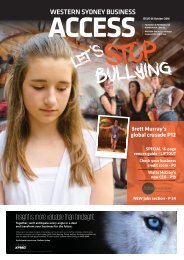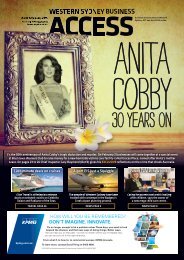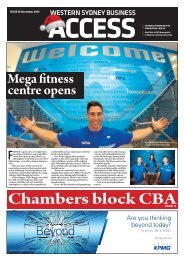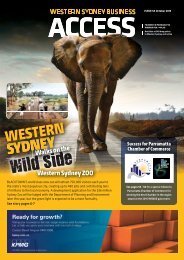RECRUITMENT
WSBA September 2015
WSBA September 2015
You also want an ePaper? Increase the reach of your titles
YUMPU automatically turns print PDFs into web optimized ePapers that Google loves.
GWSRR<br />
“I think that’s the science of recruitment. Over years and years we get a gut feel<br />
- that of intuition; when you meet someone.” - Scott Henshaw.<br />
WWW.WSBA.COM.AU<br />
Continued from page 26<br />
long ago, it was easy to say: I want an auditor.<br />
I think more and more, an understanding<br />
of what sort of auditor with what sort of<br />
qualifications, with what sort of experience,<br />
with what sort of industry background, what<br />
sort of motivators and drivers, with what sort<br />
of a raft of different things come with that, is<br />
becoming more and more important. As the<br />
market arguably gets cluttered with communication<br />
and information, before you can think<br />
realistically about going out there and finding<br />
what it is you like, you really need to distil that<br />
down to, you know, a specific: This is what I<br />
want to find.<br />
Jim Taggart: So Scott, who creates that<br />
brief? Can I just say, the first part of today is<br />
really looking at just the employee/employer<br />
relations and getting that. The second part<br />
is really looking for the solutions of how, in<br />
particular, TAFE can provide that. But, I’m<br />
just really interested in the quality of that brief<br />
– because quite often people say: I didn’t get<br />
the person I wanted, or these things.<br />
Scott Henshaw: Absolutely. And it’s<br />
interesting. To Alison’s point earlier, I’m spending<br />
more time with employers supporting them to<br />
understand their exact requirements. There are<br />
some great job analysis type tools out there<br />
at the moment. I’m having open and frank<br />
conversations with managing directors – leaders<br />
of organisations – highly capable people,<br />
often saying: “I’m not exactly sure what I want.<br />
Hardeep Girn: So, I’ll ask the same question<br />
from Jim, but in a different way. Imagine,<br />
there’s a brief in terms of the specific skills are<br />
required and the qualifications that might be<br />
required for an individual. When does that<br />
brief go over and beyond those core skills that<br />
are required, where the employer would probably<br />
choose somebody who has skills beyond<br />
their role, such as social media? So, if an auditor<br />
is doing an auditing job, do they need to<br />
know social media? No. But, if it’s something<br />
that is included in terms of extra value from<br />
somebody who’s a great candidate, ticks all<br />
the boxes in the role description of an auditor,<br />
then what percentage of those candidates<br />
are over and beyond the core skills needed?<br />
Conversations that we’ve had with business,<br />
indicate considerable crossovers exist with different<br />
verticals and a good understanding of<br />
where the organisation fits in the industry that<br />
they’re in, is necessary.<br />
Nicole Karagiannis: I don’t know that<br />
I can put a percentage as such. But I guess<br />
where we’re taking this conversation, we’re<br />
taking it into the spectrum of technical and<br />
non-technical skills, let alone the debate of<br />
qualifications. And, even within qualifications,<br />
there’s a debate of TAFE or Uni qualifications<br />
– and that’s an interesting debate or discussion<br />
to be potentially had separately. But, even<br />
in the skills spectrum, I think employers are<br />
looking for those technical skills or experience<br />
Hardeep Girn.<br />
WESTERN SYDNEY BUSINESS ACCESS SEPTEMBER 2015<br />
Nicole Karagiannis and Scott Henshaw.<br />
as a first. And the more astute as a leader you<br />
are, the more you start to think about the nontechnical<br />
space. So, that takes us right back<br />
– so it’s a bit of a full circle – to leadership,<br />
which is what we were touching on. If I’m<br />
disgruntled with my leader, or if I’m a managing<br />
director who knows what I’m looking for,<br />
there’s leadership as a common denominator<br />
in all the conversations we’ve had so far. So,<br />
the more knowledgeable and the more strategic,<br />
or the more really well rounded leader that<br />
I am, the more open I will be to looking for<br />
the non-technical skills, be it in social media<br />
skills or be it, you know, the ability to, you<br />
know, even build teams.<br />
Scott Henshaw: EQ.<br />
Nicole Karagiannis: EQ. Thank you. So,<br />
someone with those skills around the ability<br />
to rally the rest of your auditors, or the ability<br />
to bring everyone to a more positive platform -<br />
your engagement, your culture – they’re great<br />
skills to finding in specific resources. But only<br />
a great leader or an astute or open minded<br />
leader is going to look for those, rather than:<br />
here’s my checklist. I need someone who can do X<br />
task and run this spreadsheet for me.So, we really<br />
easily find ourselves in the leadership debate<br />
or the qualification debate.<br />
David Pring: Can I just jump in there for<br />
a minute?<br />
Nicole Karagiannis: Sure.<br />
David Pring: I think a lot of those issues<br />
that we are looking at are issues that we’ve<br />
been dealing with and looking at in terms of<br />
qualifications, etc. I think that the issue that<br />
business is coming up with now, is: what’s<br />
going to happen? Every business is disrupted<br />
through technology, through automation,<br />
through disaggregation of business. And what<br />
business needs then is two additional things.<br />
In addition to all of the skills, etc, is: how<br />
resilient is someone to working in an environment<br />
of change. We all tend to dislike change.<br />
We all like security. We all like to know what’s<br />
in it for me.<br />
Michael Walls: Is uncertain.<br />
David Pring: Dealing with that whole<br />
uncertainty piece. And the level of resilience<br />
that comes with that I think is one issue that<br />
we have to deal with more and more.<br />
Alison Wood: Which is also tied into<br />
generational difference as well. And those<br />
resilience indicators – and I’m sure that the<br />
recruiters would identify the differences with<br />
younger people not having particularly a lot<br />
of resilience of having very different ways of<br />
being brought up.<br />
David Pring: So, that’s on the employee<br />
side. On the employer side, the employer<br />
doesn’t know what the business is going to<br />
look like in five years. And so, having a workforce<br />
that can deal with change, I think is critical.<br />
And another skill that I’d look for is any<br />
evidence that the person has had in thinking<br />
about problems different, be it critical reasoning<br />
– you know, coming through education<br />
or examples of where they’ve done things or<br />
been exposed to things.<br />
Jim Taggart: Scott, I want to go back to<br />
you. I want to talk about these risk profiles,<br />
because they are a growing phenomenon<br />
in which to measure both quantitative and<br />
qualitative elements of people. What’s in those<br />
documents that has not been there previously?<br />
Scott Henshaw: I think if I could distil<br />
it into one word, it’d be around “risk”. I think<br />
employers more and more are looking to<br />
de-risk the employment decision. And, you<br />
know, the use of – and let’s just throw them<br />
into a bundle, and there are a variety of them<br />
for all sorts of different industries and applications<br />
and jobs – but let’s refer to them<br />
as psychometric assessment tools. I think it<br />
helps employers de-risk that decision – you<br />
know, traditionally – and they still have their<br />
part – good screening processes, good behavioural<br />
based interviews, reference checks<br />
are powerful tools. We go into social media<br />
checks now, Facebook profiles, LinkedIn,<br />
assessment centre etc. We can find out a whole<br />
heap of information about individuals. But I<br />
think that the psychometric assessment tool<br />
isn’t a decision maker. It’s not a pass or fail<br />
thing. What it’s best used to do is confirm or<br />
deny consistency through the process, both in<br />
terms of what an employer was after in terms<br />
of skill set, capability, emotional intelligence,<br />
motivation, personality type, but also get a<br />
good sense and feel that the messages that<br />
this candidate has presented throughout, and<br />
what I have felt from this candidate throughout,<br />
match up and are consistent. I’m getting<br />
a similar story at each of those contact points<br />
with the candidate. It’s still a risky decision.<br />
But if I’m doing all of these things – and more<br />
and more employers are wanting to do more<br />
of them – I’m happy to make the decision<br />
– because you said it earlier: the investment<br />
you’ve got to make to find them, the time it<br />
costs to invest your time to induct them, the<br />
training investment that you’ll put into and<br />
need to put into top talent, to hang on to<br />
them, it’s time consuming and it’s pricey. So,<br />
we want to get that decision right. And I think,<br />
fundamentally, de-risking the decision making<br />
process has widely seen an increase in the use<br />
of assessment tools.<br />
Alison Wood: To what you’re saying,<br />
Scott: it’s cultural fit. And that’s where the<br />
psychometric testing, you know, has to play<br />
a role – because the cultural fit for a not for<br />
profit will be very, very different to the cultural<br />
fit for KPMG, for instance. I mean this is general<br />
– you know – they’re gross stereotypes.<br />
But, that’s the reality, is it’s about getting the<br />
right person.<br />
Scott Henshaw: Well, I think it comes<br />
back to a little bit of – and you hear a lot in<br />
the current world – and particularly in the<br />
social media world – about “authenticity”<br />
and “genuineness”. And, you know, you can’t<br />
be something in social media land that you’re<br />
not in employment land. Therefore, if you are<br />
genuine and authentic when we look at Facebook<br />
and LinkedIn and all these other things<br />
we can find, you get feelings and thoughts and<br />
you make assumptions about what sort of person<br />
this is, what they think, how they behave,<br />
where they hang out. You wrap the rest of the<br />
recruitment process around that. And, as long<br />
as that is consistent and telling you the same<br />
Continued on page 28<br />
27






